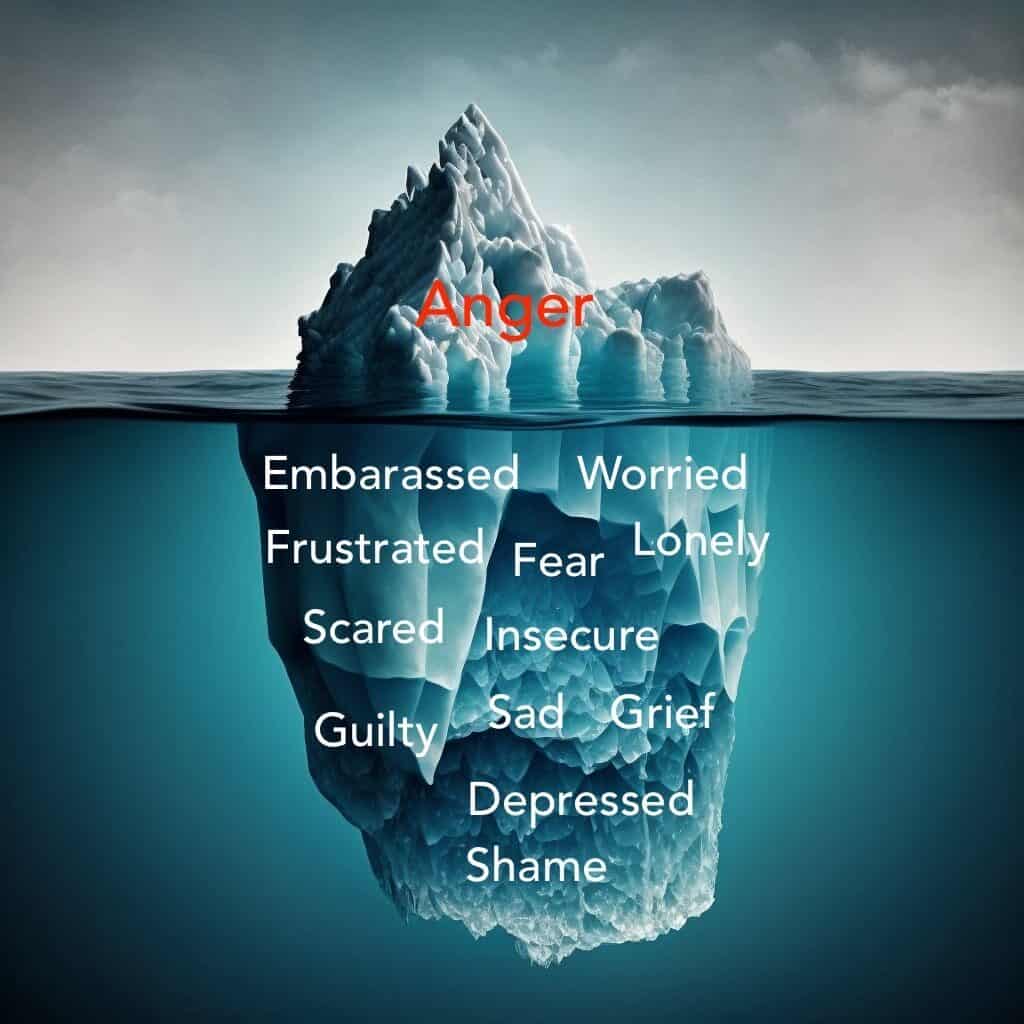We’ve all been there. You’re on your way out the door and your sweater catches on a doorknob, thrusting you backward. It’s a little thing, but you’re absolutely furious. In situations like this, where annoyance is perfectly reasonable, we have to wonder how we went to red-hot anger so quickly.
Usually, we’ll find that it isn’t the doorknob—or the snarky customer service agent, or the tailgating driver—at the root of our fury. Instead, they’re just the final straw on the back of an emotionally overburdened camel.
Anger is usually so intense that it’s easy to see. But how did we get here? Anger is often just the tip of the iceberg. Other emotions that were harder to notice, or harder to acknowledge may be hidden beneath the surface.
Reflecting on an inappropriately angry response to a minor irritant can help us identify the deeper emotion—whether it’s fear, or sadness, or fury—within us.
What Is The Anger Iceberg?

The Anger Iceberg is a metaphor that helps us understand how the manifestation of anger is just the tip of the iceberg of our emotional lives.
The tip of the iceberg represents the visible expressions of anger, while the much larger portion of the iceberg hidden beneath the water represents the underlying and often unnoticed deeper emotions at play such as sadness, disappointment, embarrassment, grief, shame, guilt, post-traumatic stress…
Just like an iceberg, the bulk of what drives anger is hidden beneath the surface. By understanding and addressing these underlying emotions, we can gain a deeper understanding of our anger and learn to manage it more effectively before the burnout happens.
When a person goes to therapy and talks about feeling very angry over a small issue, the therapist will help them understand the underlying feelings causing this anger. The reason is that anger can have many different causes, and they may not be immediately obvious. By exploring deeper, we can identify the root causes of our emotions.
For instance, someone might be upset with their partner because they feel like their partner isn’t helping around the house enough. But as the therapist asks more questions, they may realize that the person is feeling jealous of their partner’s career success or resentful of having to take care of their child alone every afternoon. As the person works through these layers of feeling, the therapist can help them come up with a plan to address and resolve the issue.
Couples counseling can also provide the space and guidance to work through these complex emotions together and improve communication, helping both partners understand each other’s perspectives and needs.
Looking For Therapy?
Start Healing Today.
212-960-8626
Anger is a Secondary Emotion
if you feel angry, you’ve skipped a step. Anger is a unique emotion that serves as a defense mechanism to protect us from overwhelming primary emotions or sensations.
When we feel angry, it means that a different feeling was too difficult for us to handle, and our body automatically turns to anger to shield us from it.
So, if you are feeling angry, it’s likely that you skipped a step and missed the initial feeling that triggered your anger. Essentially, anger acts as a cover-up for the primary emotion that was too much for us to handle when we were younger.
How To Harness the Anger Iceberg
If you find yourself becoming excessively angry in response to small matters more often than seems right, there is likely something more serious and intense brewing under the surface. Adopting a mindfulness practice can help.
To release the power that anger has over us requires understanding the primary emotion that the anger is there to protect. To really discover and address the ultimate source of your anger, you might want to start working with a mental health counselor who can help you examine your triggers, unpack your reactions, and locate the root cause. Look for one that practices anger management therapy.
Dive Deep With the Anger Iceberg Technique
The therapists at Manhattan Mental Health Counseling are compassionate, skilled, and ready to help you explore the depths of your emotional well-being. We prioritize easy access for our clients and accept a wide range of insurance plans. Can’t make it into our office for in-person appointments? No problem. We are more than happy to provide online sessions in the comfort of your own home. Contact us today by calling 212-960-8626 or by filling out our online contact form.

